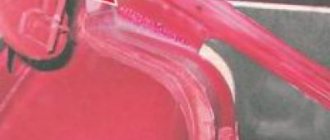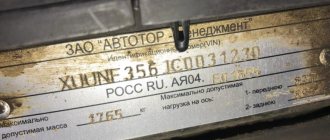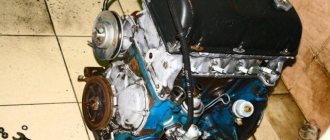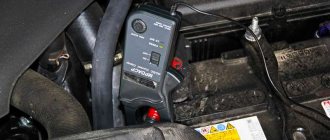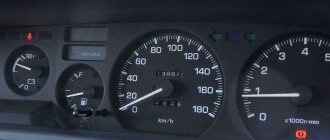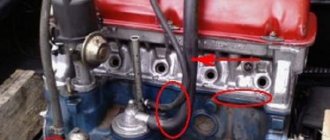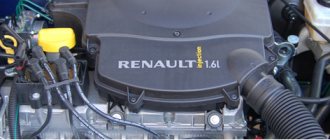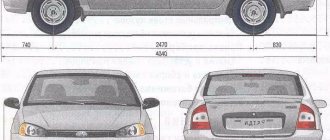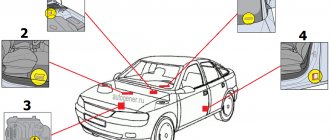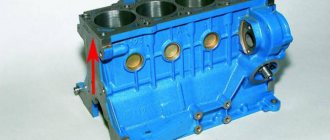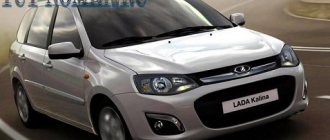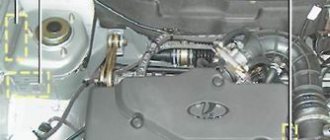Before purchasing a vehicle, you need to check the car’s engine number, otherwise you risk facing serious troubles - for example, the car may be reported stolen. If the symbols on the engine do not match those written in the documents (PTS or STS), are damaged, subject to severe corrosion or are missing, this may make it impossible to register the car with the traffic police.
How to find out the engine number by VIN code
You will need:
- look at the engine number directly on the body itself;
- compare the symbols on the engine housing with the symbols on the vehicle registration certificate;
- in the absence of a vehicle registration certificate, compare the number with the one indicated on the PTS;
- if the number is not on the engine (this happens on American cars), look at what number is on the vehicle's passport (it is always there).
It is necessary to separately check the correspondence of the number on the part with the value in the documents, separately check for theft and separately check the condition of the symbols - they could have been erased, or they could have been “rewritten”.
Also read: How to check the technical condition of a car engine
On some car engines, the symbols on the plate are damaged. Sometimes the engine number is not on the car at all, although it is provided by the manufacturer. Or letters and numbers can simply be “interrupted”, for example, if the car is stolen.
WMI
The first 3 characters of the first part are the designation of the manufacturer's international indication code.
The first symbol is the geographical zone, the second is the country located in this zone, the third is the specific manufacturer. A manufacturer may have multiple WMIs. But different manufacturers cannot use the same number. Only after 30 years have passed after its first use can it be assigned to another.
Despite the fact that the standard clearly defines the manufacturer's mills, this is often not used. On cars of the General Motors division with its head office in Germany, the WO sign is placed, regardless of the country of origin.
Self-check engine number
To check when purchasing a car that the engine number matches the data in the documentation, you do not need any special equipment. When meeting with the car seller, open the hood and find the number on the unit body.
It is usually engraved on a metal pad located under the oil level dipstick. The location of the plate may vary from car to car, but for most cars it is located there.
The symbols may not be easy to see, especially if the motor is dirty or the plate is in an awkward location that is difficult to clean or difficult to see without a mirror.
First of all, if the motor is covered with dust or dirt, wipe the engine number plate with a damp cloth or napkin. You may need a lot of napkins, keep in mind that you need to clean and see 17 characters - numbers and letters of the Latin alphabet. If you cannot see all 17 signs after cleaning the sign, put a mirror - it will help you see what is difficult to see.
It is also important to remember that many symbols are similar to each other, such as the number zero and the letter "O", or the number "one" and the letter "I". Most often, when “interrupting” a stolen car, it is the similar symbols that are changed, so pay attention to them to see if there are any signs of interference and attempts to change them to similar symbols.
Having read the number, compare it with what is indicated in the documents - the vehicle registration certificate, or, if it does not exist, in the vehicle passport. If everything matches, it means that everything is in order according to the documents, but this does not mean that the car is not listed as stolen.
Also read: How to determine a broken body number
Mark detection problems
During operation, the motor is necessarily covered with a layer of dirt. It does not allow you to quickly see the numbering of the unit. Therefore, experienced car owners are advised to always clean the engine and wash it.
Some manufacturers place the engine markings in a place where they can only be seen using a small mirror. For example, in a Ford car, it is stamped on the very bottom panel , right under the attached oil filter. It is enough to lower the small mirror and the markings become clearly visible, and you can do without removing the protection.
Checking the engine number at the traffic police
A difficult way to check for theft, without guaranteeing reliability, is to contact law enforcement agencies. Only if you have already met with the seller, this may be difficult. Sometimes the traffic police database cannot give a prompt response, and if the car is actually listed as stolen, police officers will be tasked with seizing the vehicle. It cannot be ruled out that you will be made a witness in a criminal case of car theft, and you hardly want to participate in all the lengthy bureaucratic processes associated with the investigation - after all, you just wanted to buy a car.
The vehicle is checked by the traffic police using the VIN code, but it is important to remember that the VIN and engine number do not match. If the engine number was “interrupted”, it cannot be ruled out that the attackers also counterfeited the vehicle title. And coupled with a “broken” VIN code, there is a possibility that the car will not have any complaints according to the traffic police database, and in the end you will fall for the scammers.
Where are the body numbers on the VAZ-2110
Engine 1.5 l 8 valves carburetor
The ancestor of the ten family, well known to car enthusiasts from the eighth model Lada. Easy to maintain and repair, as a result of a thoughtful, logical layout, dozens moved under the hood, with all the features, including the location of the unit number. The plate is hidden in the upper part of the end side of the block under the carburetor and cannot be seen during a quick inspection. This place is characterized by oil ingress when topping it up, leaks from under the sealing rings of the distributor, fuel pump gaskets, antifreeze when replacing the thermostat. Metal corrosion also takes its toll. The motor was installed on the 2110 from 1996 to 2000. The placement of the block number has not changed.
Briefly about its characteristics.
The carburetor four-cylinder engine with a volume of 1 5 liters developed
- Power 72 l s (53 kW);
- torque 104 Nm;
- up to 100 km/h - 14 s.;
- Consumption - 7 6 l/100 km.
Engine Number VAZ 2110 8 Cl
The VAZ 2110 engine uses gasoline from AI-92 to AI-95 as fuel. The location of all VAZ 2110 engines is different, both in terms of power measurement and volume. Now we will carefully tell you about all the main engines that we encounter under the hood of the VAZ-2110.
The 10 was originally developed on the VAZ-2108 platform, so the parts and components are likely to be similar. The first 2110 engines were very similar to the 1.5-liter VAZ-21083 engines with 8 valves and a carburetor. But there were some differences in the engine settings. A photo of the 8-valve carburetor engine of the VAZ 2110 under the hood of the car is just below.
In fact, visually, the engine is not enough, how does it differ from the “eight-digit” engine.
The parts are probably interchangeable. These engines received an order of 110 at the start of sales in 1996. The engine was installed on the car before 2000. The built-in 4-cylinder engine had a metal block and a duralumin cylinder head. The timing belt uses a timing belt. This version of the motor, when the belt breaks, in other words, the valve jump does not bend . The camshaft has an overhead position.
The four-stroke carburetor engine was not environmentally friendly, moderate fuel consumption and the highest reliability. The carburetor had a number of advantages, such as maintainability, simplicity of design, and the ability to repair independently and omnivorously. But there were also disadvantages, such as unstable operation, obstacles during cold starts, excessive fuel consumption and other problems with carburetor power units. Further details Properties of the VAZ-2110 engine .
Engine number VAZ LADA 8 cl. Grant, 2114, Nissan ON-DO, Kalina, 2109, 2108, Largus
- Volume. 1499 cm3
- Number of cylinders 4
- Number of valves 8
- The cylinder diameter is 82 mm.
- Move. 71 mm
- Power. 72 hp (53 kW) at 5600 rpm
- Torque. 104 Nm at 3800 rpm
- Compression ratio 9.9
- Supply system. carburetor
- Acceleration to 100 km/h 14 seconds
- Maximum speed 164 km per hour
- Average fuel consumption is 7.6 liters.
Checking through a specialized service
If you want not only to quickly obtain information about a car from the traffic police database, but also other data about the car, and in just a couple of minutes, order a full report on the car from the specialized service “Autocode”. This is a quick way to check a car engine for theft, as well as get a complete picture of the car using various databases and file cabinets.
The report includes information from the traffic police database, the database of the Federal Bailiff Service, auto insurers and much more.
Checking the engine number through the Autocode service will give you a complete picture of whether the car is listed as stolen, whether everything is in order from a legal point of view, and you will also know the history of accidents, pledges and loans. In other words, after purchasing a full report and if it contains only positive information about the history of the car, all you need to worry about is the technical condition of the car associated with the operation of the previous owner.
If you are a professional car seller, use the “Autocode Pro” unlimited car check service. “Autocode Pro” allows you to quickly check a large number of cars, add comments to reports, create your own lists of liquid vehicles, quickly compare options and store data about cars in an orderly form.
If there are no serious problems in the car’s history and you decide to buy, take the final step - run the seller’s passport details through the car owner verification service. This service will show whether he has problems with the law, whether his passport is valid, whether there are debts and enforcement proceedings. If the inspection finds serious problems, it is better to refuse the deal. View an example report
Techniques of car thieves
The places where the VIN is located are not very convenient to read. Hijackers sometimes try to take advantage of this - they “edit” a number that is located in a more or less comfortable place, “forgetting” that it may be located somewhere else. As a rule, naive clients do not look there and get away with deception.
The technique of interrupting numbers is an art, although it is punishable by law. But there is also very crude work that is easy to detect: new symbols are simply knocked out on top of similar old ones. Such a sign still looks suspicious - it has an excessive relief and is not always easy to read.
The original code cannot contain:
- Differences in the font used;
- Putties;
- Weld seams;
- Various depths of embossed characters;
- Various panel thicknesses.
If any of the above points are present, this should at least alert you.
The conclusion in this case suggests itself: when purchasing a car second-hand, you need to study all the places where the VIN may be present, and also carefully consider all the symbols present.
There should be no scratches or dents near the plate - this means that no one tried to unscrew it. Knowing where the body number is located and exactly how it should look, you can protect yourself from purchasing a problematic car.
Table of examples of VIN decoding of well-known foreign cars
| VIN | Decoding |
| 4USBT53544LT26841 | BMW E85 (Z4) Z4 3.0i M54, roadster - 2 doors, Dingolfing, Germany |
| KL1UF756E6B195928 | CHEVROLET Rezzo/Tacuma 1.6, minivan - 5 doors, petrol manual transmission, 2006 Bupiyong |
| ZFA18800004473122 | FIAT, Punto 80 ELX 188AXB1A, hatchback - 3 doors, 188A5.000 (1242 cc / 80 hp) March 2002 |
| JHLRE48577C415490 | HONDA CR-V 2.4 RVSi K24Z1 (2400 DOHC VTEC), MZHA (automatic - 5speed), 2007 |
| KMHBT31GP3U013758 | HYUNDAI Getz GL 1.1 l, manual - 5 speed, November 2002, manufactured by UI-San (Korea) for sale in Germany |
| KNDJC733545301768 | KIA Sorento GL 4WD EB / FC 3.5l (MPI-DOHC), automatic. - 4th century, April 2004 for sale in the USA |
| SALFA28B57H011265 | LAND-ROVER Freelander II 2.2 TD4 diesel/2179 cc/152 hp (DOHC/EFI), mechanical - 6th grade, January 2007 |
| JMZGG128241207606 | MAZDA 6 27C / GH7 petrol - 1800 cc, 5MT, September 2003. |
| 4JGBF71E47A278782 | MERCEDES-BENZ GL 450 4Matic 273923, box 722904, May 2007, assembled Sindelfingen (Germany)/Vance, Alabama, USA |
| JA4LX31G93U065670 | MITSUBISHI Outlander M-Line 2WD CU4W(QRMEL2M) 2400 ccm, automatic transmission - 4 speed, November 2002, 3rd decade |
| JN1TBNT30U0124100 | NISSAN T30 X-Trail Sport QR25DE (petrol - 2.5l), Automatic gearbox, May 2006. |
| WP1AB29P66LA68044 | PORSCHE CAYENNE S M48.00, 2006 |
| VF1LB0K0525551701 | RENAULT Clio II K4J [B/1390 ccm/70kW], gearbox JB3/DP0 |
| JF1GGGKD37G038841 | SUBARU Impreza (G11) WRX 4WD 255, manual. — 5th century, February 2007 |
| JT111TJ8007010945 | TOYOTA Land Cruiser HDJ80 1HDT, October 1992 |
